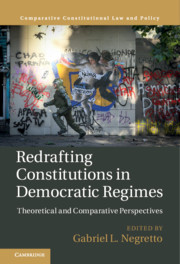Book contents
- Redrafting Constitutions in Democratic Regimes
- Comparative Constitutional Law and Policy
- Redrafting Constitutions in Democratic Regimes
- Copyright page
- Dedication
- Contents
- Tables
- Contributors
- Acknowledgments
- 1 New Constitutions in Democratic Regimes
- Part I Conceptual, Normative, and Empirical Issues
- 2 Constitution Making through Law
- 3 Expanding Revision Clauses in Democratic Constitutions
- 4 Courts and Constitution Making in Democratic Regimes
- 5 Replacing Constitutions in Democratic Regimes
- Part II Case Studies
- Index
- References
5 - Replacing Constitutions in Democratic Regimes
Elite Cooperation and Citizen Participation
from Part I - Conceptual, Normative, and Empirical Issues
Published online by Cambridge University Press: 29 August 2020
- Redrafting Constitutions in Democratic Regimes
- Comparative Constitutional Law and Policy
- Redrafting Constitutions in Democratic Regimes
- Copyright page
- Dedication
- Contents
- Tables
- Contributors
- Acknowledgments
- 1 New Constitutions in Democratic Regimes
- Part I Conceptual, Normative, and Empirical Issues
- 2 Constitution Making through Law
- 3 Expanding Revision Clauses in Democratic Constitutions
- 4 Courts and Constitution Making in Democratic Regimes
- 5 Replacing Constitutions in Democratic Regimes
- Part II Case Studies
- Index
- References
Summary
This chapter discusses the impact of direct citizen participation and elite cooperation in constitution making on the deepening of an already existing electoral democracy. It argues that cooperation among a plurality of elected political representatives at the constitution-making stage is likely to improve the liberal dimension of democracy after the enactment of the new constitution. Inclusive constitutional agreements at the elite level and the dispersion of power that makes them possible not only facilitate the creation of legal limits on state action but also provide opposition parties and citizens alike with the means to make institutional constraints on executive power and civil liberties effective. This effect is usually observed during the early years of life of the new constitution, when the balance of power among the political forces that created the constitution tends to remain stable. The chapter shows preliminary support for this argument analyzing aggregate data and selected case studies from all episodes of democratic constitution making in the world between 1900 and 2015.
Keywords
- Type
- Chapter
- Information
- Redrafting Constitutions in Democratic RegimesTheoretical and Comparative Perspectives, pp. 101 - 128Publisher: Cambridge University PressPrint publication year: 2020
References
- 2
- Cited by

